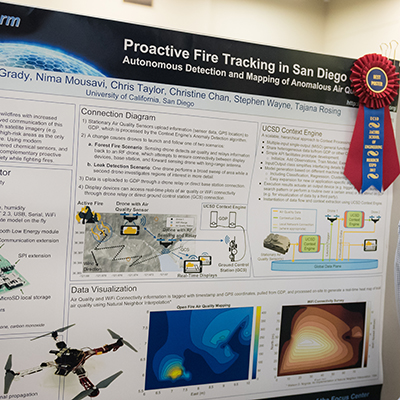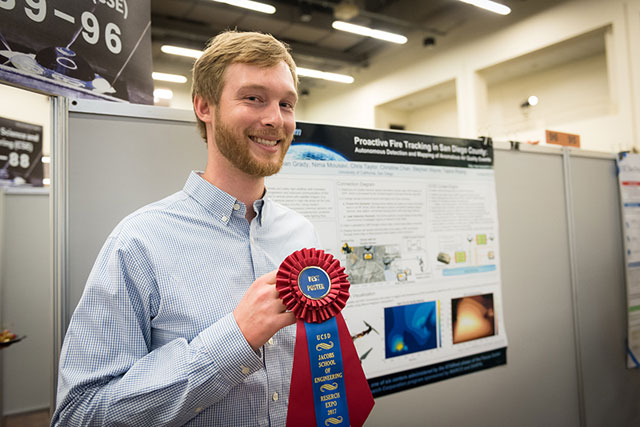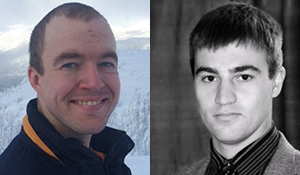
A truly interdisciplinary team finished the 2017 Jacobs School of Engineering Research Expo with the Best Poster award in the Computer Science and Engineering category. The departmental prize went to a team of students from CSE and ECE advised by CSE computer engineering professor Tajana Rosing. The title of their prize-winning poster: "Proactive Fire Tracking in San Diego County."

from the lab of CSE Prof. Tajana Rosing that received the
Best Poster award in the CSE category.
The presenter was ECE Ph.D. student Michael Ostertag (Ph.D. '18), who, jointly with Christine Chan, also an ECE PhD student, built the fire- sniffing subsystem for the drones. His collaborators included CSE graduate Sean Grady (M.S. '16), now a software engineer in the Bay Area with Clariture, and computer science Ph.D. student Chris Taylor, who jointly built the drones and developed the software needed to control them. A recent ECE graduate, Stephen Wayne (M.S. '16), developed the software-defined radio subsystem for the drones and is a software developer with JStar LLC in Denver, Colorado, and ECE Ph.D. student Nima Mousavi jointly (with Michael Ostertag), implemented the UCSD context detection.
The poster looked at the challenge of many fires striking remote areas where satellite images or local optics are the only methods to survey them. According to the team's abstract, "intermittent satellite imagery is ineffective for determining real-time conditions, forcing responders to risk being unaware of changes in the wildfire dynamics. This may result in inadequate strategies to combat the fire."

Ph.D. student Chris Taylor
The students' solution was to improve information about location and spread of fires to help the first responders react more effectively and safely. "By integrating modern advancements in aerial drones, low-powered chemical sensors, and adaptive wireless communication, these challenges may be overcome," the researchers noted. They constructed a prototype using a mobile, modular air-quality analyzer that can monitor levels for "NO2, CO, O3, CO2, VOCs, temperature, pressure, and humidity. The sensors are mounted atop a quadcopter controlled by a Raspberry Pi that communicates wirelessly," according to the abstract, and both "air quality and RF-connectivity data are transmitted with timestamps and GPS locations for real-time visualization and analysis."
In addition to the winners of the departmental Best Poster awards, a Ph.D. student in materials science and engineering, Byungji Kim, won the Best Overall Poster at the 2017 Research Expo. His subject: "Tweaking the Immune System: Targeted Fusogenic Nanoparticles for Immunogene Therapy against Bacterial Infection." Like the CSE project, Kim's project was also interdisciplinary: his advisor was Chemistry and Biochemistry professor Michael Sailor, who is also affiliated with the Materials Science and Engineering program.

